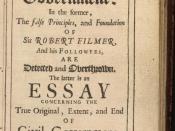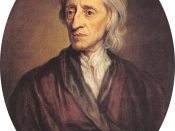Author: John Locke
Born: August 29, 1632; Wrington, Somerset, England
Died: October 28, 1704; Oates, Essex, England
Author Profile:
Locke is known for his political writings (the Two Treatises of Government are the basis for the principles used in the American and British constitutions) and for his epistemology, which is the central focus of "An Essay Concerning Human Understanding." He never wrote a work devoted specifically to ethics, but he did develop a fairly clear stand on the nature of ethics. His "An Essay Concerning Human Understanding" is the most important of his works in terms of his ethical views, but "Two Treatises", "Some Thoughts Concerning Education" (1693), and "The Reasonableness of Christianity" (1695) also contain some of his ideas on the subject.
Biographical Background.
Locke came from the non-Anglican Protestant community in England, learning as a child the virtues of Calvinist simplicity but little of the harsh, judgmental aspect of that sect.
He was educated at Oxford University, but he moved away from the then-fashionable scholasticism and, under the influence of Robert Boyle, began to study practical science. He chose medicine as his specialty and worked with the famous Thomas Sydenham. He never took his degree or practiced medicine (the former was not required for the latter at that time), but the influence of his training would remain with him.
After completing a diplomatic mission in 1665, Locke returned to Oxford and immersed himself in the writings of René Descartes. Two years later, the Earl of Shaftsbury, a school friend, invited Locke to become his personal physician and live with him. Locke proved to be as much secretary as doctor, helping his patron with such projects as the Constitution for the Carolinas. He was also elected a fellow of the Royal Society.
In 1675, Locke began a long visit to France both for his health and to expand his study of Descartes. He returned home in 1679 only to face political problems when his patron, Shaftsbury, was accused of treason. Although he was acquitted, Shaftsbury fled to Holland in 1681, and Locke, who had held some minor government posts under Shaftsbury's influence, found it best to follow his example. After Monmouth's Rebellion (1685), Locke was branded a traitor, and the English government demanded his extradition. The Dutch paid little attention, and Locke lived quietly, continuing work on what was to be An Essay Concerning Human Understanding. He returned home after the Revolution of 1688 and increasingly divided his time between London, where he served as a commissioner of appeals, and Oates, the Essex home of his friends Sir Francis and Lady Masham. It was in this comfortable, supportive home that Locke, in the 1690's, was at his most prolific, though his Essay and Two Treatises had been in development for years.
Ethical Views:
Like Thomas Hobbes and some other philosophers, Locke defined good as that which gives, or is conducive to, pleasure. His is a very individualistic view, for it allows no room for altruistic pleasure. He also asserted that there were no inborn attitudes, including ethical principles. As an empiricist, Locke, whom most students know for his assertion that the mind is at birth a tabula rasa or blank slate, on which experience writes, logically concluded that ethical principles must be learned. He also asserted that such ethical principles were as logical and scientific as mathematics, but he was never able to prove his case.
Unlike most strict empiricists, however, Locke was also a theist. The natural laws of ethics, he asserted, could be learned deductively and hence applied to all human beings. They also came to people as revelation. Thus, natural law and divine law were the same. The importance of the former was that it was accessible to all, not only to mystics and those who believed in their pronouncements of God's messages.
Theism also influenced Locke's ethics in another way. When he had to consider why an individual would follow ethical principles, especially when another course of action might seem more conducive to his pleasure, Locke fell back on the fear of ultimate punishment. Whatever the potential for short-term pleasure, failure to observe the laws of ethics would result in long-term suffering.
Implications for Ethical Conduct:
Despite the inconsistencies that other philosophers have pointed out in his ethical views, Locke's ideas have been consistently popular. This seems to be because, for most people, inconsistent beliefs are common, and Locke's positions are much like those of a typical modern Western person. Modernism has produced liberal Christianity, in which the believer is encouraged to select those principles that seem to fit his or her observations of life and produce happiness. While not exactly Locke's view, the view of liberal Christianity is close enough to encourage a continuing interest in his writings.4 Students are more likely to start reading his work because of his importance in political philosophy and epistemology than because of his ethics, but as they discover his ethical views and find them congenial, they will keep them in the public view.
Principal Works:
* Epistola de Tolerantia, 1689 (A Letter Concerning Toleration, 1689)
* A Second Letter Concerning Toleration, 1690
* Two Treatises of Government, 1690
* An Essay Concerning Human Understanding, 1690
* Some Considerations of the Consequences of Lowering of Interest, and Raising the Value of Money, 1692
* A Third Letter for Toleration, 1692
* Some Thoughts Concerning Education, 1693
* The Reasonableness of Christianity as Delivered in the Scriptures, 1695
* Some Thoughts on the Conduct of the Understanding in the Search of Truth, 1706
* The Works of John Locke, 1823 (10 volumes)
Endnotes
1. Goldie, Mark (2004) John Locke Icon of Liberty. Hisory Today, 2004, Vol. 54 Issue 10,
2. Yolton, John W. John Locke: Problems and Perspectives. London: Cambridge University Press, 1969
3. Van Fred R. (1994) John Locke Salem Press.
4. Walker, Lewis J. (1999) John Locke, Rebel With A Cause Wall Street, Vol. 9, Issue 7



Simply the best!!!
I have studied a lot of articles on this topic at cheathouse but find it the best yet. Well done.
4 out of 6 people found this comment useful.